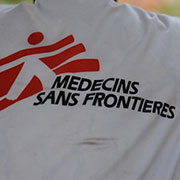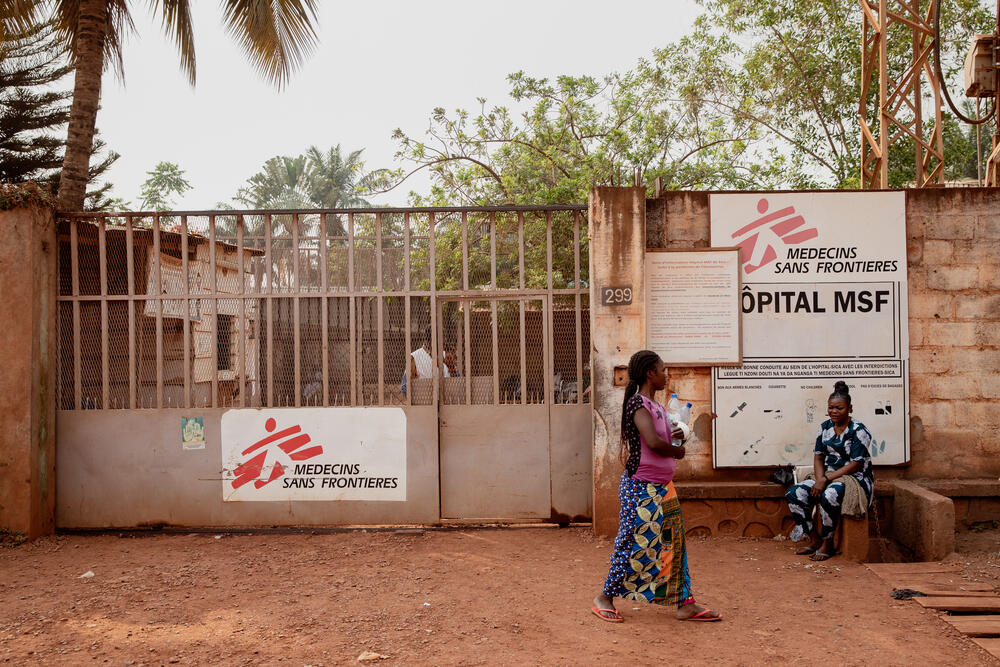Surgery: A last glance, for courage
In an operating theatre in the Central African Republic, Italian anaesthetist Gabi looks into the eyes of a critically injured young patient as he loses consciousness. There are challenges ahead…
We are lying down, each on their own sofa, lost in their own world: someone updates their diary, someone studies a video of a new surgical technique, and someone entertains his far-away child with a video call.
Then a trill of a notification bursts out of our three phones simultaneously and brings us back to the present…
We are in Bangui, the capital of the Central African Republic. An orthopaedist, a general surgeon and an anaesthetist, each here for six weeks to contribute to a Médecins Sans Frontières / Doctors Without Borders (MSF) project.
“The images flow fast and we each look up in the hope of reading a little less horror in the others’ faces. But we all know…”
We work in a trauma centre managed by MSF, in partnership with the state government, which sees local doctors and nurses side by side with international staff.
The message that reached us is an update on an arrival that was announced yesterday:
An MSF plane will land carrying a young man, a victim of a road accident in the previous 72 hours. Attached are the photos of his traumatised right upper limb.
The images flow fast and we each look up in the hope of reading a little less horror in the others’ faces. But we all know… that limb will be amputated, and without wasting any more precious time, otherwise the boy's life will be in danger. Assuming it's not already too late.
“Ça va aller – it will be fine, we will overcome this too”: we learned that here.
When you're about to be overwhelmed by discouragement, when you're losing hope, there's always someone who puts a hand on your shoulder and reassures you. So, we gather around the table, study together and organise the surgical plan for this young man, with the pros and cons of each possibility.
The next day, he arrives. He is very young, and can't even speak for long he’s so weak and exhausted.
£24 could pay for 12 surgical gowns for our doctors and nurses to use during surgery
The generosity of people like you means expert MSF medical teams can deliver essential medical care to people across the world.
One hundred miles from medical care
Three days earlier he was driving in the distant provinces. He climbed onto the roof of his truck to better secure the transported goods. He fell.
His right arm hurt badly and it was bleeding, but he managed to get back on the truck and reach a village. From here he is accompanied to the nearest medical centre, which is almost 100 miles away. It is the rainy season, so the bumpy roads are in even worst condition.
At the medical centre, the exposed fracture is stabilized and the wounds are treated, but the picture is dramatic and clear to all.
By now, the boy has lost feeling in almost the whole limb and he can no longer move it, he has a high fever and is frightened.
This is a medical emergency.
But there is a chance to save his life: the Sica Trauma Centre in the capital, the MSF hospital. And, thanks to the coordination network between the various NGOs and the local government, it is possible to organise an air transfer.
Now that he's here with us, we have to give it our all.
When a patient is on the operating table, their final glance before unconsciousness is always for the anaesthetist and the anaesthesia nurse… how much courage can we try to instil in those few seconds?
From his eyes, I sense that the young man trusts us completely. Even though he knows that he may not wake up, and, at best, he will wake up without his right arm.
You, who's 22 and drives trucks for a living…
You, a surprise
After the surgery, your fever and pain are gone. But so is your dominant arm.
I worry about a secure future in a country ever poorer in possibilities.
Instead, a surprise…
Thanks to your youth and grit, and the support of psychologists and physiotherapists, you get better.
Two weeks after the surgery, you chase me through the corridors and call me into the courtyard to show me your progress. You are learning to write with your left hand and you want to study. You ask me about books, especially history books, but in reality, anything goes.
You tell me that you want to study to become a teacher. Because you can be a teacher even with one arm. You say that you’ll learn to write on the blackboard with your left hand, and then it’s just reading and speaking.
Soon I must leave you to your new future. I’m coming to the end of my assignment and preparing to return home, to Italy.
“Ça va aller Gabi,” you tell me. “It will be fine, have a good trip.”
MSF and surgery
We perform tens of thousands of life-saving operations each year.
From facial reconstructive surgery in Nigeria to dealing with the human cost of bomb blasts in Yemen, our surgical programmes can focus on a specific need, or be wide-ranging – reflecting the complexities of the places where we work.



